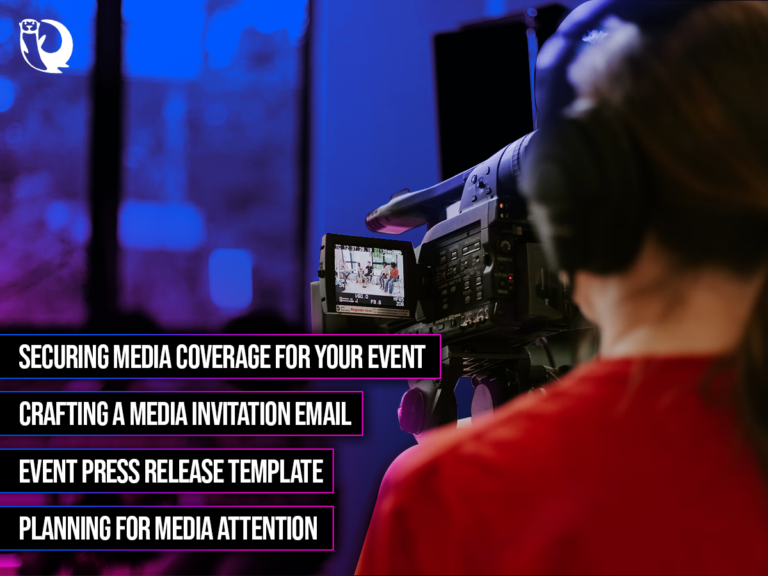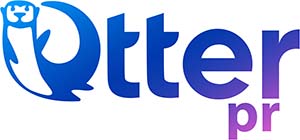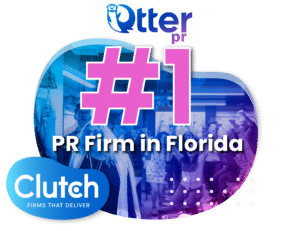Events play a pivotal role in boosting a brand’s visibility. And when media gets involved, it amplifies the buzz around what’s happening. Local media, in particular, can make or break your event. Their presence can escalate event success while their absence can create gaps in expected outcomes. But how do we ensure their attendance? And how should you react if they don’t turn up? This blog will show you how to request media coverage for an event effectively, how to navigate event planning with the media in mind, and how to write an event press release that will stand out.
Strategies for Tailoring Your Event for Optimal Media Coverage
Planning an event with media coverage in mind is crucial. It amplifies the event’s reach, boosting its impact beyond attendees. Media attention can attract a wider audience and increase brand visibility. It also adds credibility and creates lasting memories. Always think media-first for maximum event success.
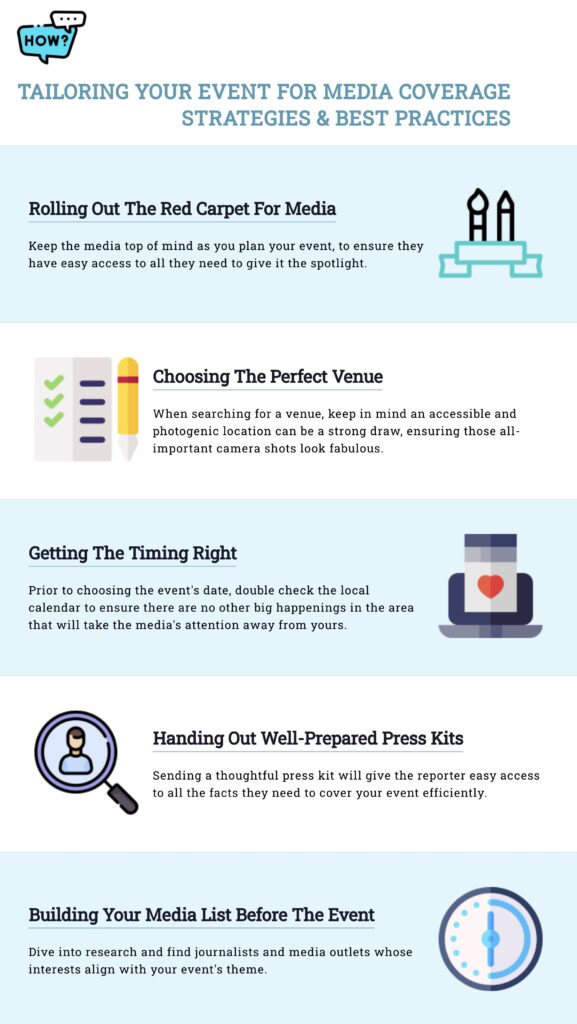
Rolling Out the Red Carpet for Media
Think of optimizing your event for media coverage as rolling out the red carpet for VIPs. It’s all about setting the stage right, making it appealing for the media to give it the spotlight.
Choosing the Perfect Venue
The right venue matters a lot. Media professionals love venues that are not only easy to get to but also offer great visuals, so this is something you’ll want to pay attention to when scouting. An accessible and photogenic location can be a strong draw, ensuring those all-important camera shots look fabulous.
Getting the Timing Right
Scheduling your event is like setting a stage play – timing is everything. You’d want to check the local calendar to ensure your event doesn’t overlap with other big events in the city. This way, you’re not competing for media attention and can expect better coverage.
Handing Out Well-Prepared Press Kits
Think of press kits as your event’s resume. It’s your chance to make a great first impression. Pack them with all the essential details about the event. This way, reporters have all the info they need to cover your event smoothly, from quick facts to in-depth details.
Building Your Media List Before the Event
When planning to invite the media to your event, the first step is to build a solid media list. This isn’t about jotting down any journalist’s name you come across. It’s more like matchmaking. Dive into research and find journalists and media outlets whose interests align with your event’s theme. Think of your event as a story; now, who would be the best storyteller for it? Picking the right media personalities not only increases the chances of them attending but also ensures the coverage resonates with their audience. So, invest some time and create a tailor-made list for your event’s success.
Maximizing Your Event Publicity: Tips and Tricks for Successful PR
Crafting the Invitation to Request Media Coverage
When it comes to inviting the media, clarity is key. Think of your invitation as a crisp summary of your event. First, highlight the ‘what’. This is the core of your event, the main attraction. Next, clearly state the ‘where’. A good location description ensures no one gets lost or arrives late. Finally, don’t forget the ‘why’. This is your chance to convey the event’s significance. Why should they care? Why is it newsworthy? An effectively crafted invitation doesn’t just provide information, it captures interest and makes the media want to be a part of your story.
Media Coverage Advisory Template:
Subject: “Exclusive Media Invitation: Celebrate [Event Theme/Topic] with [Your Company/Brand Name] on [Event Date]”
Dear [Journalist/Recipient’s Name],
I hope this message finds you well. We are thrilled to extend an exclusive media invitation for our upcoming event, [Event Name], organized by [Company/Brand Name].
Event Details:
- Date: [Event Date]
- Time: [Starting Time] – [Ending Time]
- Venue: [Event Venue, Address, City, Zip Code]
- Event Theme/Topic: [Brief about what the event is about]
Highlights of the Event:
- [Special guest/Keynote speaker details]
- [Performance or notable activity]
- [Any exclusive launch or announcement]
- [Other attractions or main events]
Why attend?
Our event promises insightful sessions/discussions on [specific topic or purpose of the event]. This is a golden opportunity to capture exclusive content, interviews, and behind-the-scenes moments.
Additional Information:
- Parking: [Parking availability and location]
- Dress Code: [If any, e.g., Formal, Casual, Themed]
- Media Contact: [Your Name], [Your Position], [Your Contact Number], [Your Email]
We believe this event aligns perfectly with [Journalist/Publication’s focus] and would be of significant interest to your audience. An exclusive press area will be set up, ensuring you have the best vantage point and access to all activities.
Please confirm your attendance by [RSVP Deadline, e.g., “August 30th, 2023”], so we can make necessary arrangements. You can RSVP by replying to this email or contacting us directly at [Your Contact Number or Email].
We sincerely hope to see you there and look forward to your positive response.
Warm regards,
[Your Full Name]
[Your Position]
[Company/Brand Name]
[Company’s Contact Number]
[Company’s Address]
[Company’s Website URL]
Remember to personalize this template to fit your event’s specifics and the tone of your organization. The clearer and more compelling your invitation, the more likely the media will want to attend the event.
Post-Invitation Steps
After sending out your media invitations, don’t just sit and wait. A friendly reminder can make all the difference. About a week before the event, consider giving your invitees a call or sending a follow-up email. This isn’t just about nudging them; it’s a chance to rekindle their interest and address any questions they might have. It can also give you a better idea of how many media representatives to expect. Remember, everyone’s busy, and a little reminder can ensure your event stays on their radar.
Follow-up Email Template:
Subject: Friendly Reminder: [Event Name] on [Date] – Hope to See You There!
Hello [Media Contact’s First Name],
I hope this message finds you well. I just wanted to touch base regarding our invitation to [Event Name] taking place on [Date] at [Venue]. We believe this event aligns well with [Media Outlet’s] readership and audience, and it would be an honor to have you there.
Here’s a quick rundown of the event details:
Event: [Event Name]
Date: [Event Date]
Time: [Start Time] to [End Time]
Location: [Venue Address]
Highlights: [Brief list of key speakers, activities, or notable guests]
If you’ve already RSVP’d, fantastic! We look forward to hosting you. If not, please let us know by [RSVP Deadline] so we can ensure all arrangements are in place.
If you have any questions or need more information, don’t hesitate to reach out. Your presence would significantly enhance the event, and we genuinely hope to see you there.
Warm regards,
[Your Name]
[Your Position]
[Your Company]
[Your Phone Number]
[Your Email Address]
Tips for Contacting Different Types of Media Outlets
Local TV:
When approaching local TV stations, remember they’re visual mediums. They love dynamic footage and interesting soundbites. When inviting them, emphasize any visually compelling elements of your event, like vibrant decor or lively performances. Offer them exclusive soundbites or interviews, and maybe even suggest potential angles the spokesperson can take. This not only makes their job easier but also increases the chances of your event being featured prominently.
Newspapers, Magazines, and Blogs:
Written media outlets, like newspapers, magazines, and blogs, prioritize in-depth content. They appreciate well-researched press releases paired with high-quality images. When reaching out, provide them with all the essential details about your event and consider offering exclusive insights or interviews. High-resolution photos, especially those capturing the essence of your event, can be a huge plus. This helps journalists and editors visualize the story they can tell.
Radio:
Radio is all about the auditory experience. When inviting radio stations, focus on the sounds of your event. Can you provide intriguing interviews or snippets of any music or speeches that will be featured? Consider arranging for a live broadcast from the event or an exclusive pre-event interview. Remember, for radio, it’s about capturing the atmosphere and essence of your event in sound.
How to Request Media Coverage for an Event: Strategy Outline
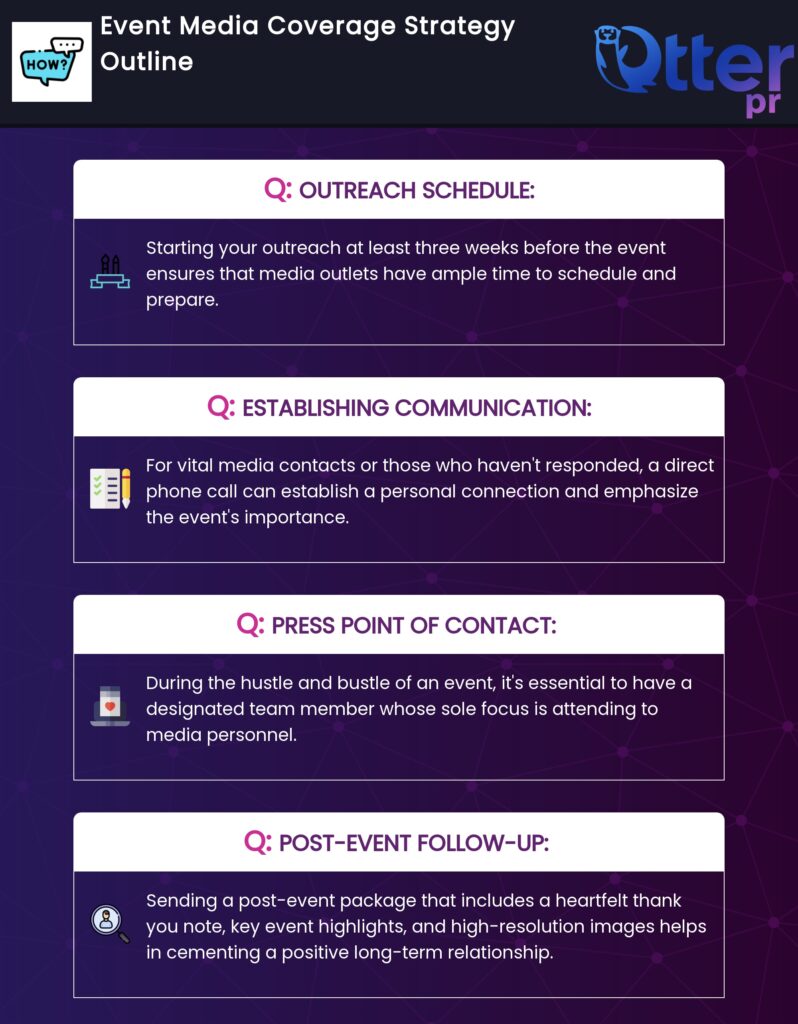
Outreach Schedule:
Planning is the foundation of any successful event. Starting your outreach at least three weeks before the event ensures that media outlets have ample time to schedule and prepare. This lead time respects their busy calendars and increases their chance of covering your event.
Establishing Communication:
While emails are often the go-to choice because of their convenience and record-keeping ability, phone calls shouldn’t be underestimated. For vital media contacts or those who haven’t responded, a direct phone call can establish a personal connection and emphasize the event’s importance.
Press Point of Contact:
During the hustle and bustle of an event, it’s essential to have a designated team member whose sole focus is attending to media personnel. This person can promptly address any queries, ensure the media gets the best event experience, and facilitate interviews or interactions.
Post-Event Follow-up:
The relationship with the media doesn’t end when the event does. Sending a post-event package that includes a heartfelt thank you note, key event highlights, and high-resolution images helps cement a positive long-term relationship. It’s also an excellent way to ensure the media has all the necessary resources for post-event coverage.
Dealing with Lack of Media Presence:
Even with meticulous planning, there might be times when expected media outlets don’t show up. Instead of seeing this as a setback, view it as an opportunity. Capture the event’s essence with high-quality photos, videos, and summaries. Share these materials widely on your platforms and tag media outlets, ensuring your event still gets noticed. “Social media is almost as common as word of mouth and TV/radio ads for learning about companies”; Therefore, it’s a good idea to utilize these platforms during and after your event to help gain a significant amount of attention.
Media Coverage Invite vs. Event Press Release
An event press release and a media coverage invitation serve different purposes. The press release announces event details to the broader media, giving an overview and highlighting its significance. On the other hand, a media invitation is a direct call to journalists, urging them to attend and cover the event. Think of the press release as a news story, while the invitation is a personalized request to media professionals.
How to Write a Press Release for an Event
A press release isn’t just an announcement; it’s a ticket to capturing the media’s attention. Whether your event is in-person or virtual, a compelling press release can be the bridge between your event and extensive coverage. But the trick isn’t just in crafting the perfect release; it’s also about finding and connecting with journalists who will find your event relevant and worth covering. By doing so, you ensure your event’s news reaches the right eyes and ears.
What Is A Press Release: How To Write And Distribute One
Research Your Target Audience:
Before writing your press release, it’s important to know who you’re writing for. Dive into a bit of research to understand your target audience’s interests, habits, and preferences. Are they more inclined towards formal announcements or do they appreciate a hint of creativity? Are they more tech-savvy and likely to attend virtual events or do they prefer traditional gatherings? Knowing your audience will not only help tailor your message to resonate with them but also guide which media outlets and journalists would be best to target. When your press release speaks directly to its intended readers, it increases the chances of your event being a roaring success.
Formatting is Key:
When it comes to press releases, the way you pitch information is just as crucial as the information itself. Proper formatting ensures your message is clear and easy to grasp. Utilizing headers and subheaders can guide readers through your content, and bullet points can highlight key details. A well-structured release can grab a journalist’s attention and make your event stand out from the rest.
Must Include:
Every press release has foundational elements that should never be skipped. Start with a captivating title that piques curiosity. Follow it with a compelling lead that briefly summarizes the event. The body should delve into the event’s details, while the publishing date ensures timeliness. Don’t forget the boilerplate, which provides a short about-us section, and always add contact information for further inquiries. An added touch? Include an actual event invitation alongside your press release. This invites the journalist to experience and cover your event personally.
Types of Press Releases:
Depending on your event’s accessibility and timing, there are different press releases you can craft. For closed events, you have upcoming releases that announce what’s about to happen and concluded releases that discuss what took place. Open events also have the same divisions: upcoming and concluded. Recognizing the type of event and tailoring your press release accordingly ensures that journalists get the right information in the right context.
Event Press Release Template
Subject: [Eye-Catching Subject, e.g., “Announcing: Annual Tech Symposium 2023 – The Future of Innovation”]
Dear [Journalist’s First Name],
I hope this email finds you well. We’re excited to share a significant upcoming event that we believe will resonate with [Journalist’s Publication/Outlet] and its readers. Please find below our official press release detailing all the information.
FOR IMMEDIATE RELEASE
[Catchy and Informative Title: e.g., “Annual Tech Symposium Returns to Silicon Valley this Fall”]
[City, State, Date] — [Opening sentence, e.g., “Tech enthusiasts and professionals from across the globe are set to gather in Silicon Valley for the decade-celebration of the Annual Tech Symposium, from September 15-17, 2023.”]
[Provide a brief overview, e.g., “Celebrating its 10th year, the Annual Tech Symposium stands as the nexus for tech innovators, startups, and stalwarts to demonstrate advancements, exchange ideas, and cultivate collaborations.”]
Event Highlights:
Date & Time: [e.g., September 15-17, 9:00 AM – 6:00 PM]
Venue: [e.g., Silicon Valley Convention Center, 123 Tech Lane]
Keynote Speakers: [e.g., “Tech visionary Jane Doe and emerging innovator John Smith”]
Special Segments: [e.g., “Interactive workshops, tech showcases, and a unique spotlight on promising tech startups.”]
[Insert an engaging quote, e.g., “This year’s symposium promises an unmatched confluence of minds and ideas,” comments Alan White, Symposium organizer. “Our diverse lineup ensures an enlightening experience for all attendees.”]
Ticketing & Registration:
Secure your spot and avail early bird discounts until [specific date] at [website link].
About [Your Organization’s Name]:
[Boilerplate, e.g., “Tech Symposium Org, established in 2010, champions the cause of innovation by creating platforms for the tech community to connect, converse, and collaborate.”]
For More Information or Interview Requests:
Contact: [e.g., Lisa Green]
Title: [e.g., PR Manager]
Email: [hyperlink the email, e.g., [email protected]]
Phone: [e.g., (123) 456-7890]
We would be honored if [Journalist’s Publication/Outlet] considers covering our event. Should you need any further details, exclusive interviews, or media passes, please do not hesitate to reach out.
Thank you for your time and consideration. We look forward to possibly seeing you there!
Warm regards,
[Your Name]
[Your Position]
[Your Contact Information: Email and Phone]
Event Press Release Examples
Networking Events Press Release:
When it comes to a networking event, the primary allure is the chance to meet and connect with like-minded professionals. In a press release for such an event, it’s pivotal to emphasize the vast networking opportunities attendees can expect. Are there any industry leaders or renowned personalities attending? Mention them! Let potential attendees know who they might rub shoulders with. Highlight any unique activities or platforms you’ve set up to encourage seamless networking, as these can be key attractions.
Music Festival Event Press Release:
Music festivals are all about the vibes, the crowd, and most importantly, the lineup. In a press release for a music fest, you’d want to spotlight the main acts — the big names that fans are eager to see. But don’t just stop there; highlight other attractions too, like food stalls, merchandise, or unique installations. Remember, the goal is to paint a picture of an unmissable experience filled with rhythm, energy, and excitement.
Non-profit Event Press Release:
For non-profit events, the heart and soul lie in the cause. So, in such a press release, it’s crucial to bring the event’s purpose front and center. Begin by articulating the cause — why is this event being held, and who stands to benefit? Are there stories you can share to humanize the event’s objectives? Additionally, shed light on any specific activities or segments designed to raise awareness or funds. Help readers understand the difference their attendance or coverage could make.
How Otter PR Can Help Your Event Gain Valuable Media Coverage
An event’s success doesn’t just rely on the number of attendees but also on how wide its echo reaches in the community. Media plays a critical role in this. Ensuring effective media coverage and creating a compelling press release are both arts and sciences that can catapult your event to grand success. If you’re looking to amplify your event’s voice and make a lasting impact, Otter PR is your go-to partner. With a proven track record in event PR and media coverage, we at Otter PR craft strategies tailored to your event’s unique needs, ensuring it resonates far and wide. Let us be the bridge between your event and the audience it deserves.
Tags: media advisory, media coverage, media relations, PR, press release, Public relations